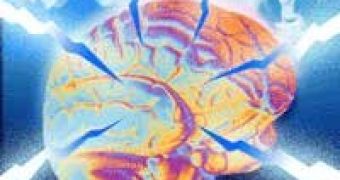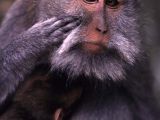Social stress induced by lower rank may be the factor that leads humans to drug consumption. At least, this is the case in monkeys, as revealed by a new research made at Wake Forest University School of Medicine and presented at Experimental Biology 2008 in San Diego. Dominant monkeys facing the same stress amount had fewer changes in the activity of the brain nuclei involved in stress and anxiety and were less prone to choose cocaine over food. Crab-eating macaques live in a complex social hierarchy established by fight. A dominant monkey can ask for a subordinate response with just a meaningful look.
Four dominant and four subordinate macaques were exposed to a socially stressful situation in which each monkey was located in an unfamiliar cage with four unfamiliar macaques. The macaque was physically safe, but he could see and hear the other foreign individuals around him fighting.
In order to see the brain activity modified by the stressful situation, each macaque had been injected with radioactive glucose. In 40 minutes, each one of them underwent a PET brain imaging to check which parts of the brain were most active (revealed by the most intense glucose consumption).
These scans were compared with those of the same monkeys taken when the animals had spent time just sitting in their cages without any stress factor. The monkey brains had very different activities, depending on the status of the individual.
In their home cage, subordinate macaques had less active brain nuclei involved in stress and anxiety (the amygdala and hippocampus) and emotional and social behavior (anterior cingulate cortex).
"These findings suggest monkeys that have to cope with constant, ongoing social stressors may have developed a lower level of brain activity even at rest," wrote the authors.
But in the unfamiliar stress situation, the subordinate male macaques displayed significantly lowered brain activity in nuclei connected to stress, anxiety, reward and emotion, whereas the dominant monkeys displayed increased activity in the reward-related nuclei.
The team made another similar experiment, but now the macaques, after spending the 40 minutes in the "stress" cage, they could choose between receiving cocaine or a food reward. The subordinate males were more likely to prefer cocaine, while the dominant males rather took the food, compared to their choices in the days before the experiment.
"These differences in both brain activity and the likelihood of using cocaine between animals of different social rank offer clues to the social context of drug use and addiction in humans," wrote the authors.
"We believe this type of research can be used to identify better treatment strategies, including providing environmental enrichment, that may affect the likelihood of abusing drugs. It's also important to understand distinct patterns of neurobiological activity occurring after acute social stress that may increase the attraction to cocaine in vulnerable individuals. Understanding the brain changes associated with stress also is critical in developing treatment and prevention strategies for disorders such as anxiety and depression that can result from chronic stress," said co-author Dr. Michael Nader.

 14 DAY TRIAL //
14 DAY TRIAL // 
